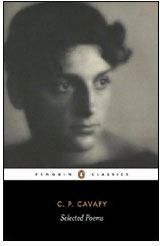Books |
C.P. Cavafy
By
Published: Feb 03, 2009
Category:
Poetry
Constantine Petrou Cavafy (1863-1933) may be one of the greatest poets of the last century, but he’s mostly known for one poem. It was the favorite of Jacqueline Kennedy Onassis, who had it read at her funeral. Easy to understand why: It’s advice from the poet about going to Ithaca, the Greek island that was home of the mythological hero Odysseus. The poet doesn’t wish a short, smooth trip for the traveler; he hopes for a long, eventful one. The last lines spell it out:
Always keep Ithaca in your mind.
To arrive there is your ultimate goal.
But do not hurry the voyage at all.
It is better to let it last for many years;
and to anchor at the island when you are old,
rich with all you have gained on the way,
not expecting that Ithaca will offer you riches.
Ithaca has given you the beautiful voyage.
Without her you would have never set out on the road.
She has nothing more to give you.
And if you find her poor, Ithaca has not deceived you.
Wise as you have become, with so much experience,
you must already have understood what Ithacas mean.
Reduced to dreadful cliché, “It’s the journey, not the destination.” And, yes, that’s clearly an idea that resonates. Equally interesting about these lines — maybe more interesting — is the language. Cavafy produced that poem in 1911, well before poets started to strip their writing of metaphor. He’s as blunt as Auden, Lowell or Brodsky; he could be writing today.
The irony is that Cavafy hardly published at all.
He was born in Turkey to Greek parents, who moved to Liverpool when he was nine and then, when he was fourteen, to Alexandria. For the last quarter century of his life, he lived in the same apartment: “Where could I live better? Under me is a house of ill repute, which caters to the needs of the flesh. Over there is a church, where sins are forgiven. And beyond is the hospital, where we die.”
From his work, you wouldn’t have known he was a poet, with a powerful influence on other writers. [Decades after his death, his poem, Waiting for the Barbarians, gave J.M. Coetzee the title of his breakthrough novel, and perhaps even the idea for it.] Cavafy was a journalist, then a clerk — for thirty years — of the British-run Egyptian Ministry of Public Works. As for his poems, he had many of them privately printed and distributed them only to his friends.
Beyond his perfectionism, Cavafy had a good reason to publish privately. While many of his 154 poems deal with classical or historical themes, some — for me, the best — are about love and sex. And Cavafy was homosexual.
What’s powerful here is not just their naked longing, but their distance — these are encounters remembered long afterward. Consider:
I’d like to speak of this memory…
but it’s so faded now…as though nothing is left-
because it was so long ago, in my early adolescent years.
A skin as though of jasmines…
that August evening- was it August?-
I can still just recall the eyes: blue, I think they were…
Ah yes, blue: a sapphire blue.
So don’t worry if the classical references in his Selected Poems elude you. Regret and loss and separation, these are things you know. What’s both spooky and reassuring is that Cavafy may know them exactly as you do and describes them exactly as you might — if you only dared.
To buy Cavafy’s “Selected Poems” from Amazon, click here.
To read some of Cavafy’s poems, click here.


